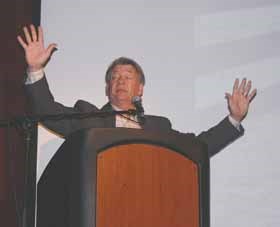The future for agriculture and mankind is a bright one.
At least that's the vision of Robert Saik CEO with the Agri-Trend group of companies who spoke to the Yorkton Rotary Club Farmer Appreciation Night at the Painted Hand Casino in the city last Friday.
"I believe things are getting better all the time," he said.
Saik said in many instances society believes things are actually in worse shape than facts suggest they really are.
As an example Saik pointed to the widely held vision we are harvesting too many trees.
"There are more trees in North America than when Columbus landed," he said.
Another example is the myth about teen pregnancies. In the 1950s teen pregnancies accounted for 80 of every 1000. Today it's 21 of 1000.
And the air quality of cities has actually been improving through recent years, said Saik.
Even the high cost of food is a myth, said Saik.
In 1920 "it took two hours (labour value) to buy a chicken," he said. Today it's 15-20 minutes "and it's cooked."
A candy bar took 20 minutes to buy in 1920. "Today it's less than two-minutes."
Saik said the health of people is also clearly improving, with life expectancy on the rise.
And generally people have more money around the world too, said Saik.
"There's still some very, very poor people in Africa, but even their earnings are rising," he said.
An improving world is good news in terms of population growth too, said Saik. In North America life expectancy is 60 per cent longer than it was in 1900, he noted.
"As you improve health birth rates decline," he said, adding many poor countries have large families as security in their old age.
Saik said the vision of the world also changes depending on how you look at it.
As an example if you adjusted a world map based on percentage of world population "Canada disappears. We have no people here," he said. "We have less people than California
"China and India are where the people are."
Change the filter to reflect people earning $100-$200 dollars a day, and North America grow in importance, said Saik.
"Africa all but disappears," he added.
Lower the wage range to $10-$20 per day, and China and India grow in importance, while Africa is still barely visible, said Saik.
Where Canada does become notable is in terms of cereal grain exports.
"There are about six growing regions in the world able to grow more than they need," said Saik, adding Canada is one of those.
In the future those regions will grow in importance as the world population doubles, adding the challenge for farmers will be to meet the demand.
"Doubling yields won't be good enough," he said, adding demand will require canola yields north of 100 bushels an acre, corn eclipsing 300 and wheat of 150.
A limiting factor in grain production is water.
"Globally water is a really big issue," said Saik. But he added "Brazil has all kinds of water," as does areas in Africa which because of political unrest "don't grow anything".
That said Saik acknowledged 1.1 million people are "without access to water" more than 85 per cent of those in rural areas.
In those areas the affect is dramatically seen in higher infant mortality rates.
"Dirty water is at the root of infant mortality," he said.
For farming water is an issue, said Saik.
"Agriculture uses 70 per cent of the world's water," he said.
As examples Saik said 120 gallons of water is used in producing one egg, 100 gallons to produce a watermelon, and 2500 gallons to produce a pound of meat.
"One steer uses enough water to float a big boat," he said.
For comparison a microchip uses 35 gallons, added Saik.
Saik said it finally comes down to viewpoints, and whether people are Malthusians or Cornucopians, in terms of a vision for the future.
Malthusians believe "we are in a hole we can't get out of," said Saik.
"Cornucopians believe we will solve all our problems."
Saik is certainly a Cornucopian and said he has confidence problems can be solved because of the rapidly expanding base of knowledge human kind has access too. He said up until 2003 there was five exabytes (billion gigabytes) of knowledge, and today that much new knowledge is created every two days. By 2013 five exabytes will be generated "every 10-minutes."
It is such vast knowledge which is creating new tools for farmers, including access to 'augmented reality' technology, offered Saik. He said such technology will allow a farmer to look at a cow and have information about the animal automatically appear in the glasses the farmer is wearing. The same will work when looking at a farm field.
Today Saik said a QR code can be assigned to bins and grain bags on the farm and be accessed by buyers and truckers with a quick cellphone scan.
In the future Saik said genetic modifications to plants will aid farmers in new ways too.
"I'd rather have the plant fight the pest than put spray on it," he said, adding GM can do that.
Saik said consumers should be embracing GM technology because it offers the chance for farmers "not to use any chemicals" because the plants themselves will be enhanced "to fight insects and disease."



